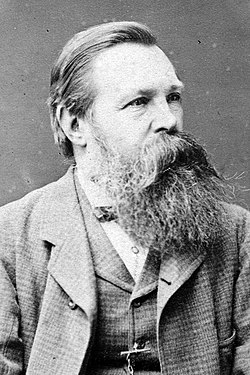Friedrich Engels Quote
True, t is only individuals who starve, but what security has the working-man that it may not be his turn tomorrow? Who assures him employment, who vouches for it that, if for any reason or no reason his lord and master discharges him tomorrow, he can struggle along with those dependant upon him, until he may find some one else 'to give him bread'? Who guarantees that willingness to work shall suffice to obtain work, that uprightness, industry, thrift, and the rest of the virtues recommended by the bourgeoisie, are really his road to happiness? No one. He knows that every breeze that blows, every whim of his employer, every bad turn of trade may hurl him back into the fierce whirlpool from which he has temporarily saved himself, and in which it is hard and often impossible to keep his head above water. He knows that, though he may have the means of living today, it is very uncertain whether he shall tomorrow.
True, t is only individuals who starve, but what security has the working-man that it may not be his turn tomorrow? Who assures him employment, who vouches for it that, if for any reason or no reason his lord and master discharges him tomorrow, he can struggle along with those dependant upon him, until he may find some one else 'to give him bread'? Who guarantees that willingness to work shall suffice to obtain work, that uprightness, industry, thrift, and the rest of the virtues recommended by the bourgeoisie, are really his road to happiness? No one. He knows that every breeze that blows, every whim of his employer, every bad turn of trade may hurl him back into the fierce whirlpool from which he has temporarily saved himself, and in which it is hard and often impossible to keep his head above water. He knows that, though he may have the means of living today, it is very uncertain whether he shall tomorrow.
Related Quotes
About Friedrich Engels
Born in Barmen in the Kingdom of Prussia, Engels was the son of a wealthy textile manufacturer. Despite his bourgeois background, he became a staunch critic of capitalism, influenced by his observations of industrial working conditions in Manchester, England, as published in his early work The Condition of the Working Class in England (1845). He met Marx in 1844, after which they jointly authored works including The Holy Family (1844), The German Ideology (written 1846), and The Communist Manifesto (1848), and worked as political activists in the Communist League and First International. Engels also supported Marx financially for much of his life, enabling him to continue his writing in London. After Marx's death in 1883, Engels edited from his manuscripts to complete Volumes II and III of his work Das Kapital (1885 and 1894).
Engels' own works, including Anti-Dühring (1878), Socialism: Utopian and Scientific (1880), Dialectics of Nature (written 1872–1882), The Origin of the Family, Private Property and the State (1884), and Ludwig Feuerbach and the End of Classical German Philosophy (1886), are foundational to Marxist theory.
